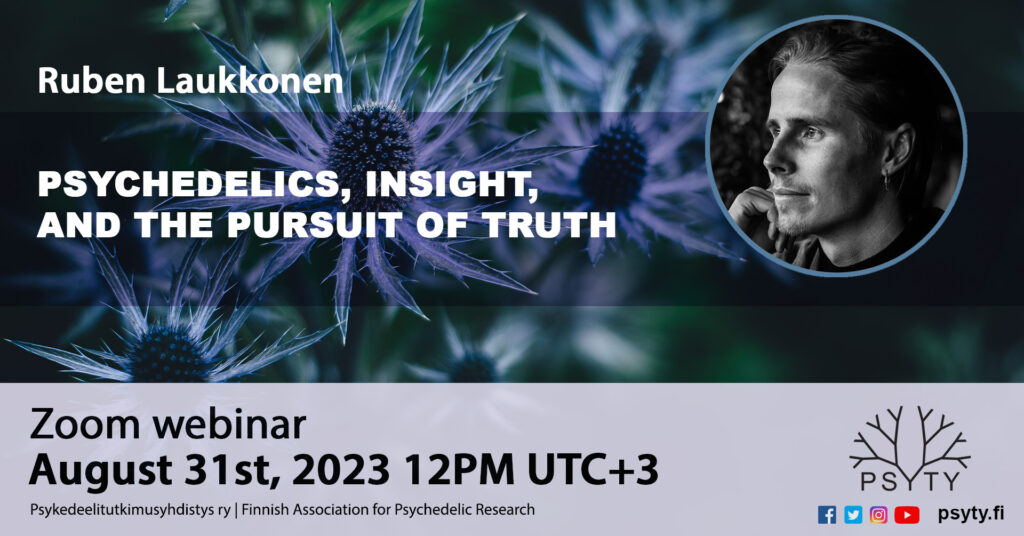Posts in Category: Events
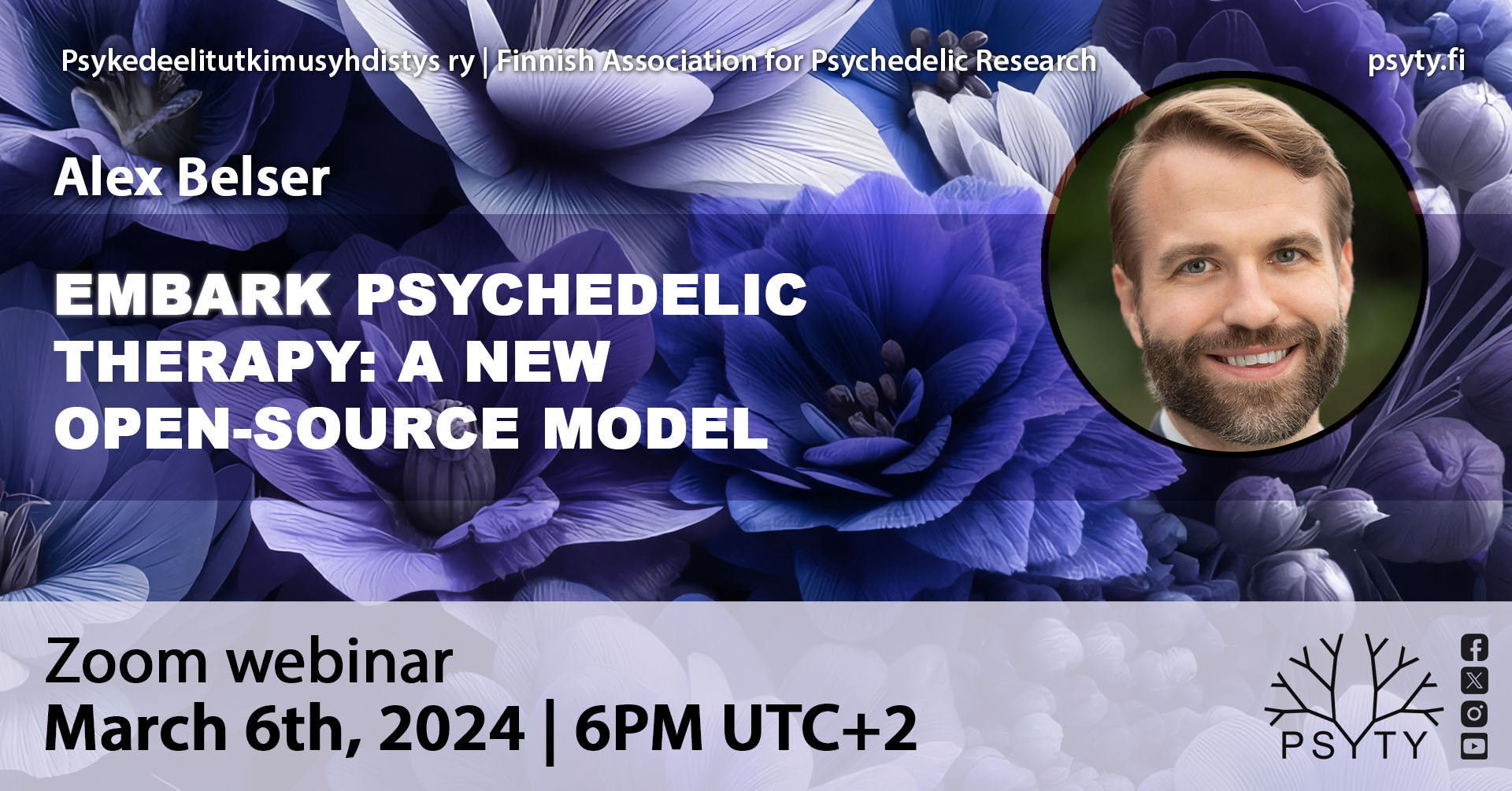
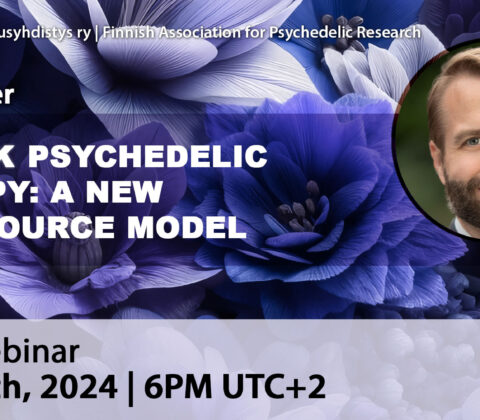
Webinar March 6th, 2024: Alex Belser – EMBARK Psychedelic Therapy: a New Open-Source Model
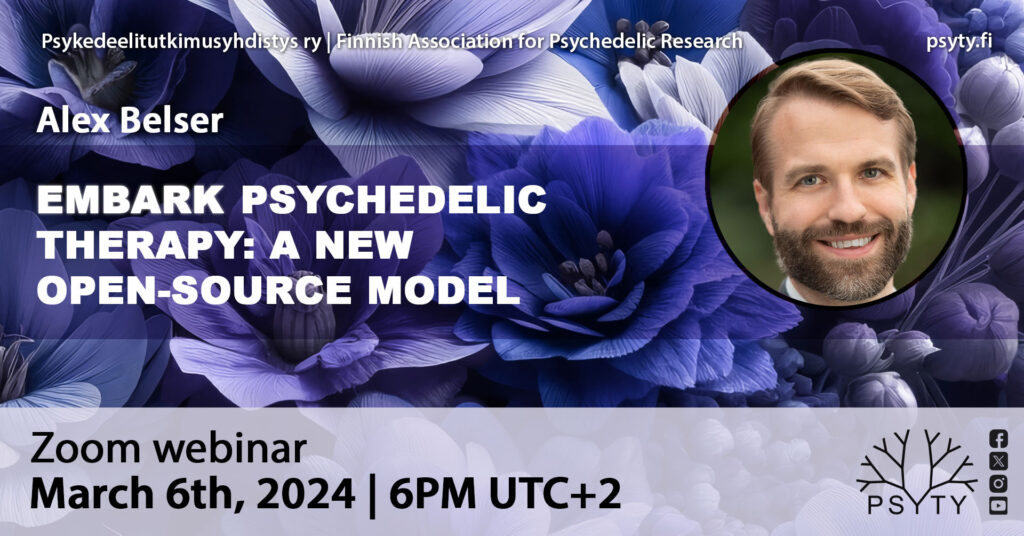
The conventional history of psychedelic-assisted therapy (PAT) research has been criticized for things such as missing critical histories of harm and the stories of marginalized groups, and a lack of focus on key therapeutic elements such as therapist–participant relationship, attentiveness to the body, counseling for spiritual experiences, and ethical considerations. On Wednesday March 6th 2024 at 6PM (UTC+2), psychologist and clinical scientist Alex Belser will introduce the EMBARK model that represents a novel model in psychedelic therapy, designed to address the limitations of previous models by offering a comprehensive, ethical, and inclusive framework.
In addition to the missing elements mentioned above, previous PAT models have suffered from underdeveloped therapeutic frames and a reliance on pre-existent evidence-based (non-psychedelic) approaches. The EMBARK model addresses these shortcomings by offering a transdiagnostic and trans-drug approach adaptable to various indications and psychedelic medicines. It is built upon four Cornerstones of Care: Trauma-Informed Care, Culturally Competent Care, Ethically Rigorous Care, and Collective Care, reflecting a foundational belief that efficacious treatment is ethical treatment.
The EMBARK acronym points to six Clinical Domains that commonly emerge in psychedelic experiences: Existential-Spiritual, Mindfulness, Body Aware, Affective-Cognitive, Relational, and Keeping Momentum. For the treatment of depression, twelve mechanisms of therapeutic change are outlined.
The EMBARK approach has a growing evidence-base: in a recent psychedelic clinical trial, 79% of participants achieved full remission from depression three weeks after treatment. EMBARK psychedelic therapy is intended to be open-sourced to the clinical community for development and adaptation to other psychedelic medicines (e.g., DMT, LSD, MDMA, ketamine) other contexts (e.g. group therapy, conjoint/couples therapy), diverse populations (e.g., LGBTQIA+ participants) and to inform the development of psychedelic practitioner training.
The event contains a Q&A section. The total length is 2 hours. Tickets are available from our web store. The event is free for charge for members who’ve paid their membership fee for 2024. If you want to pay your membership fee for this year or become a member, you’ll find our membership products on the main page of our web store. Members who have paid the membership fee will be sent a free registration link via email.
Alex Belser, PhD is a psychologist and clinical scientist exploring psychedelic therapies to alleviate human suffering. At Yale University, he’s a Co-Investigator for a study of psilocybin treatment for OCD. His book, EMBARK Psychedelic Therapy for Depression: A New Approach for the Whole Person (Oxford University Press), co-authored with Dr. Bill Brennan, offers a clinical guide to working with psychedelic medicines. He enjoys training clinicians and has taught in ten psychedelic training programs about psilocybin, MDMA, ketamine, and DMT therapies. Dr. Belser co-founded a number of early psychedelic organizations including the university team at NYU in 2006 and Nautilus Sanctuary, a non-profit psychedelic center. He served as the Chief Clinical Officer of Adelia Therapeutics and Cybin, leading clinical teams in the US and Europe. His last book is Queering Psychedelics: From Oppression to Liberation in Psychedelic Medicine. His work has been featured in the media, with coverage in the New York Times, the Atlantic, The Guardian, Forbes, Rolling Stone, NPR, and in Michael Pollan’s book, How to Change Your Mind. Dr. Belser is a teacher of hatha and kundalini yoga. He studied at Georgetown, Cambridge, Columbia, NYU, and Yale. More information is available at http://alexbelser.com and https://www.centerforbreakthroughs.com
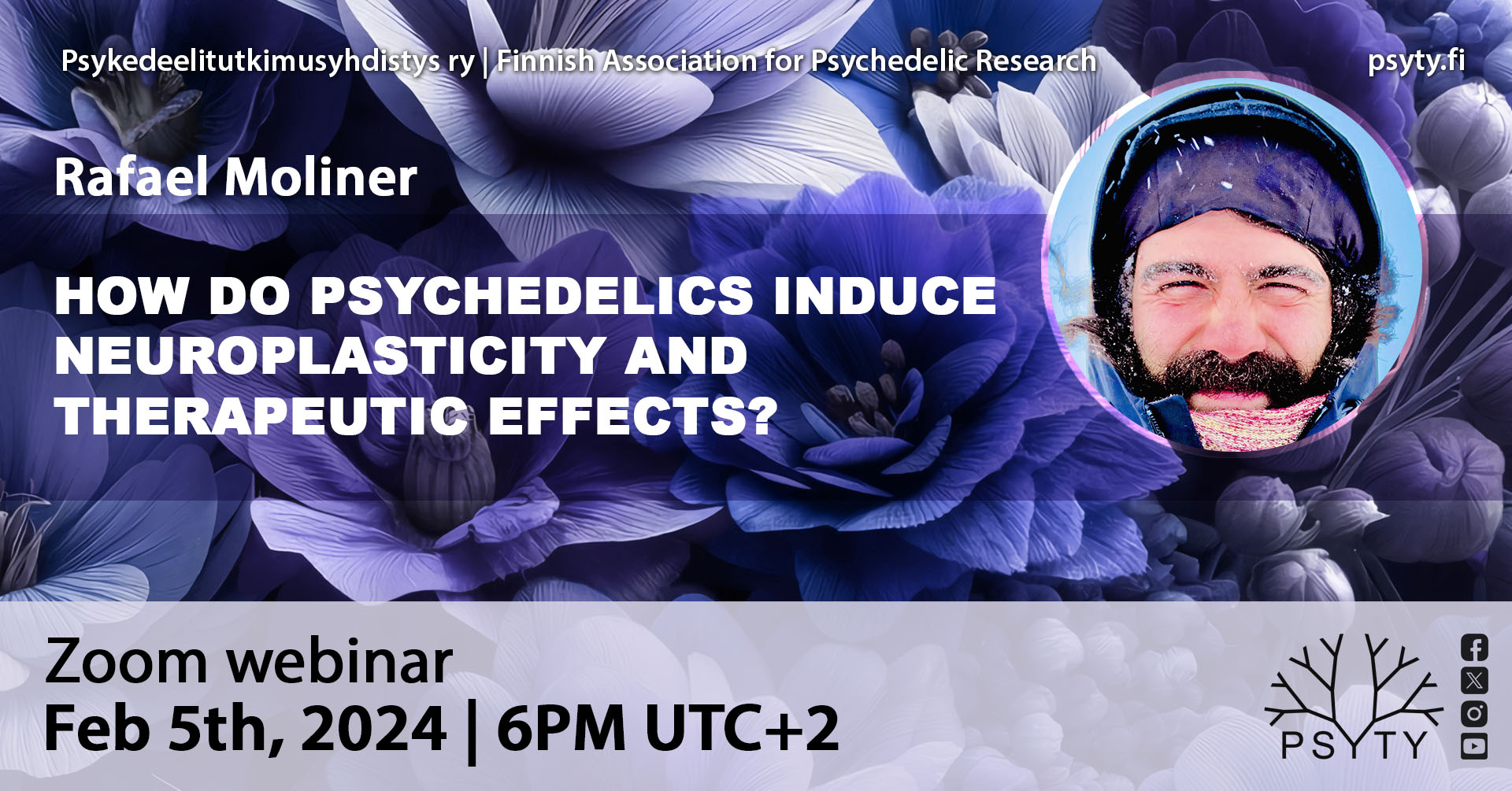
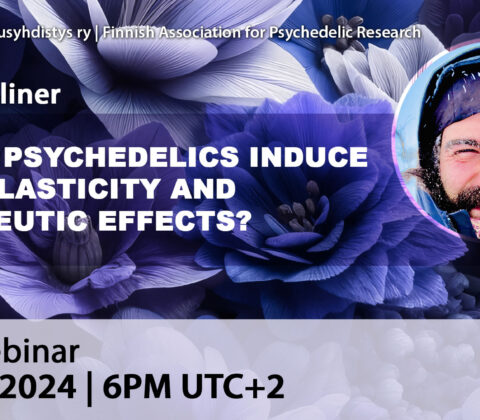
Webinar February 5th 2024: Rafael Moliner – How do psychedelics induce neuroplasticity and therapeutic effects?
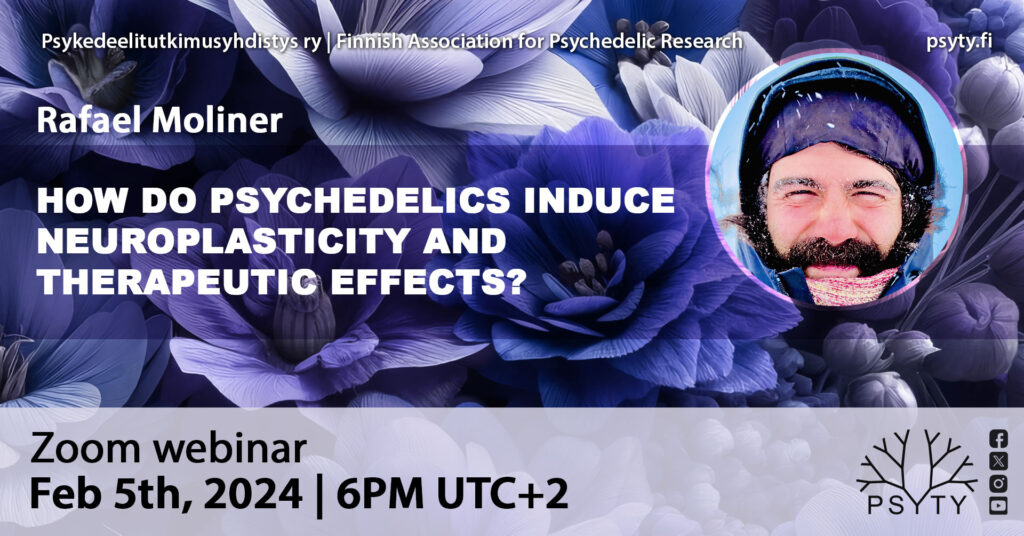
Recent studies have shed light on the potential use of psychedelics such as LSD and psilocybin for depression. While known for their quick and lasting antidepressant effects, the hallucinogenic properties of these substances, with the risks inherent to them, may limit their widespread clinical adoption. Recent research indicates that some of their therapeutic benefits might be harnessed without the hallucinogenic effects. This is one of the themes that biochemist and neuroscientist Rafael Moliner will cover in a webinar organized by the Finnish Association for Psychedelic Research on Monday February 5th 2024, 6PM (UTC+2).
Essentially all antidepressants, including fluoxetine and ketamine, act by binding to TrkB, the receptor for the brain-derived neurotrophic factor (BDNF). Moliner’s recent research, conducted at the University of Helsinki and published last year, discovered that LSD and psilocin directly bind to TrkB with affinities 1,000-fold higher than those for other antidepressants. The research provides additional support to the view of TrkB’s central role in antidepressant effects, suggesting new drugs that don’t activate the 5-HT2A receptor (which is relevant to psychedelic effects) as a promising new avenue of research.
There are several reasons to explore such drugs. Psychedelics can occasionally produce hallucinogen persisting perception disorder (HPPD) or irreversible psychotic episodes in susceptible populations, which has led to routinely excluding patients with a family history of bipolar disorder or schizophrenia from participating in psychedelic clinical trials. While there is intense ongoing debate on how much of the therapeutic potential of psychedelics is a direct result of the things experienced during the treatment sessions, it’s also obvious that there is need for new treatments for situations where such intense experiences are not welcome or even viable.
The event length is around 45 minutes for the lecture and 30 minutes for audience questions. The event is free of charge for everyone interested – you’ll receive a free participation link by registering here.
About the speaker: Rafael studied biochemistry at the Autonomous University of Barcelona (Spain) and neuroscience at the University of Helsinki (Finland). He developed his doctoral research at the laboratory of Eero Castrén, where he contributed to the groundbreaking discovery that antidepressants produce their therapeutic effects through direct binding and allosteric modulation of the BDNF receptor TrkB. More recently, Rafael had a leading role in the multidisciplinary research effort that unveiled how psychedelics with therapeutic potential bind to TrkB with much higher affinities than antidepressants, which could help explain their faster and more long-lasting effects on plasticity and antidepressant action. Importantly, his research also revealed that the therapeutic-like effects of psychedelics through TrkB are independent of their hallucinogenic action, which opens an avenue for the development of safer therapeutics with the fast and persistent antidepressant effects of psychedelics but devoid of hallucinations.
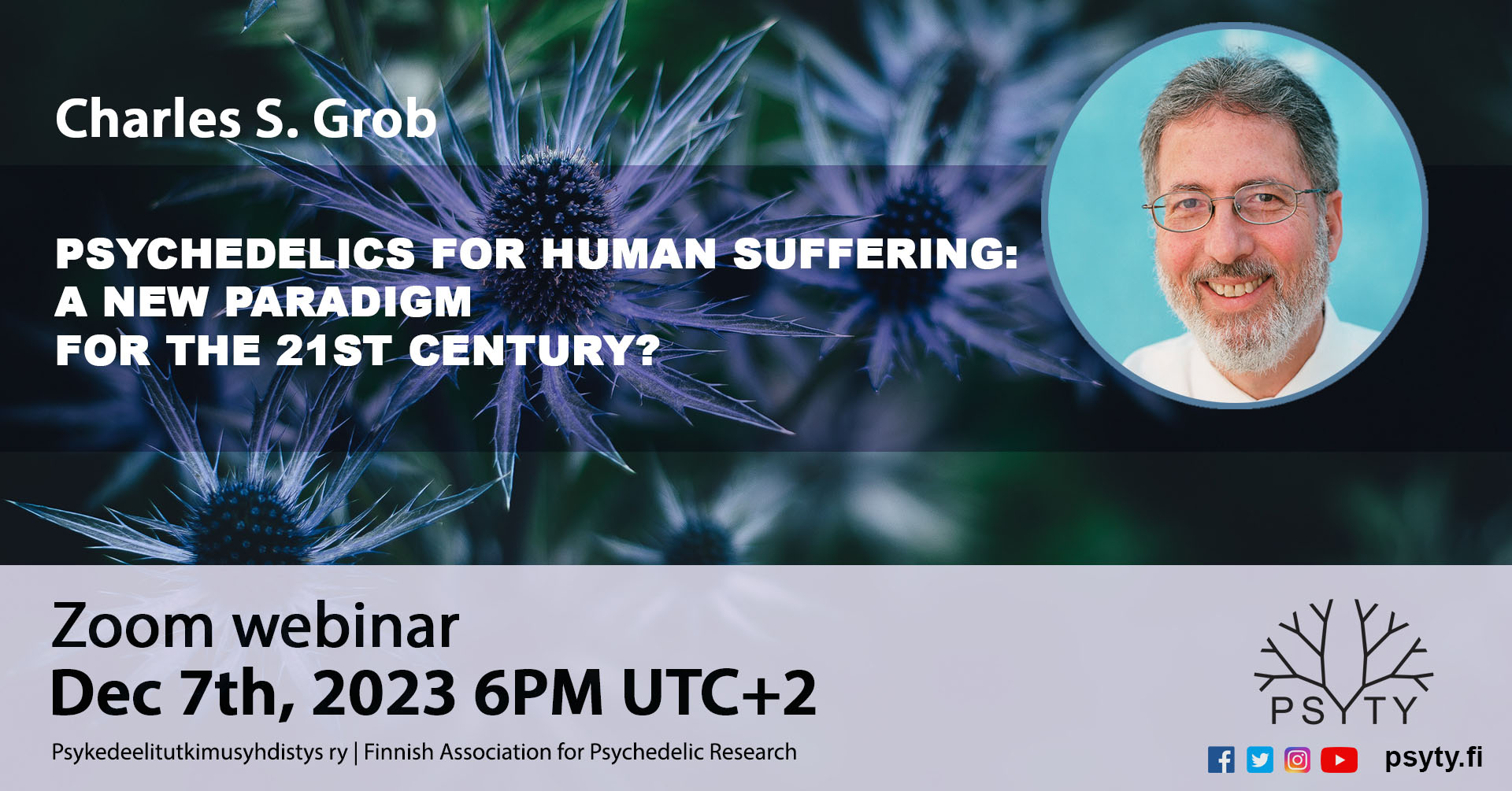
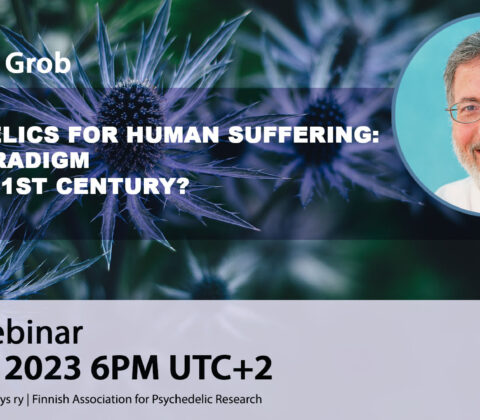
Webinar December 7th 2023 | Charles S. Grob – Psychedelics for Human Suffering: A New Paradigm for the 21st Century?
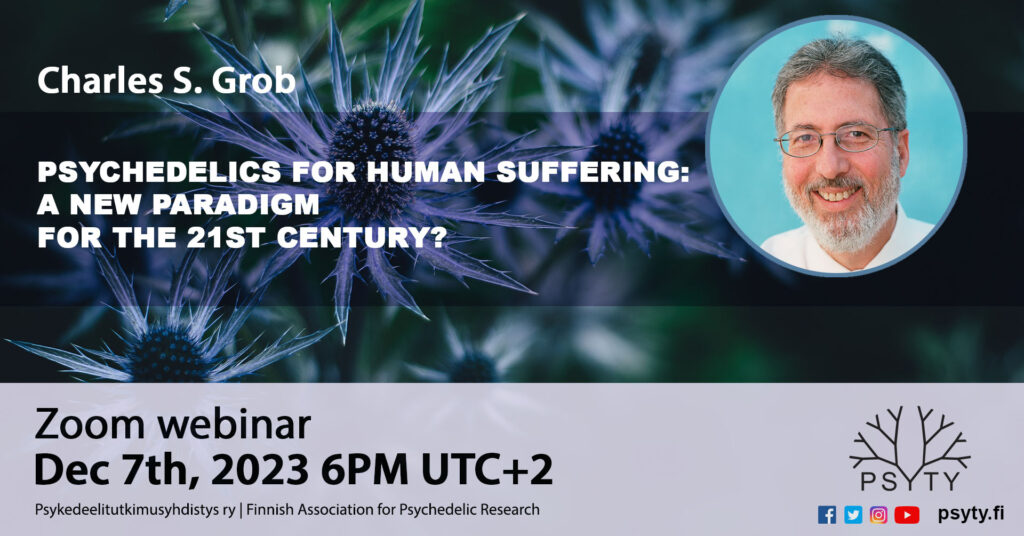
Clinical research on psychedelics has come a long way from its origins in the middle of the 20th century. One of the key figures in the current revival of psychedelic research is psychiatrist Charles S. Grob who has, since the 1990s, conducted important research on ayahuasca and psilocybin, amongst others. On Thursday December 7th, 6PM (UTC+2), dr. Grob will talk about the history of psychedelic research and the present and future implications of his own research projects – both for future projects and the practice of psychiatry and medicine.
The talk will review the history, ethnobotany, pharmacology and clinical research record of psychedelic drugs in human subjects. Prior investigations during the 1950s and 1960s will be examined as will the socio-cultural reactions that led to their termination by the early 1970s. An overview of the reemergence of psychedelic research in the modern era will be conducted, with particular emphasis on examining recent research using a psilocybin treatment model in the treatment of human subjects with advanced-stage medical illness approaching the end-of-life who are suffering from severe existential distress and demoralization.
The implications of this body of investigation will be addressed with an emphasis on the necessity to safeguard optimal safety and ethical conduct. Particular attention will be given to the rationale, methodology and development of a new multi-site research project designed to explore the utility of psychedelic treatment at the end-of-life in the palliative care setting.
The event contains a Q&A section. The total length is 2 hours.
Tickets are available from our web store. For members of the association who’ve paid their membership fee for 2023, the event is free of charge. If you want to pay your membership fee for this year or become a member, you’ll find our membership products on the main page of our web store. An email with a link for free registration to the event has been sent to members of the association. If you’re not sure if you’ve paid for your membership this year, feel free to ask us.
Charles S. Grob, M.D. is Professor of Psychiatry and Pediatrics at the UCLA School of Medicine and the Director of the Division of Child and Adolescent Psychiatry at the Harbor-UCLA Medical Center. He previously held faculty positions at the Johns Hopkins School of Medicine and the University of California at Irvine. He has conducted approved clinical research with psychedelics since the early 1990s. From 2004-2008 he was the Principal Investigator of the first study in several decades to examine the use of a psilocybin treatment model for patients with advanced-cancer anxiety. He has also conducted research into the range of effects of MDMA, in both normal volunteers and in a selected subject population of adult autistics with severe social anxiety. And, he has conducted a series of ayahuasca research studies in Brazil.
Over the last thirty years Dr. Grob has published numerous articles and chapters on psychedelics in the medical and psychiatric literatures and he is the editor of Hallucinogens: A Reader (Putnam/Tarcher, 2002), co-editor (with Roger Walsh) of Higher Wisdom: Eminent Elders Explore the Continuing Impact of Psychedelics (SUNY Press, 2005) and co-editor (with James Grigsby) of the recently published Handbook of Medical Hallucinogens (Guilford Press, 2021). He is a founding board member of the Heffter Research Institute.
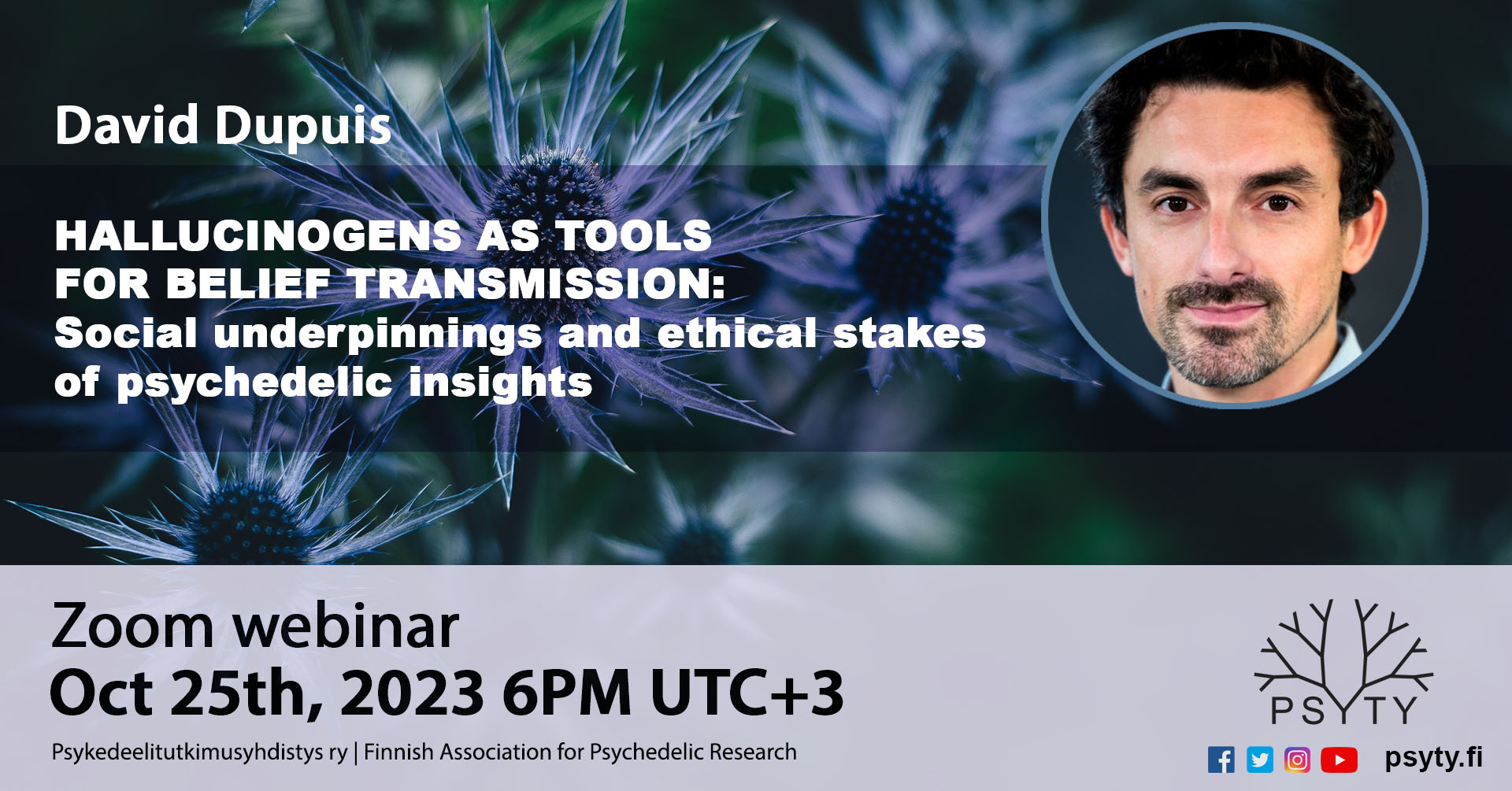
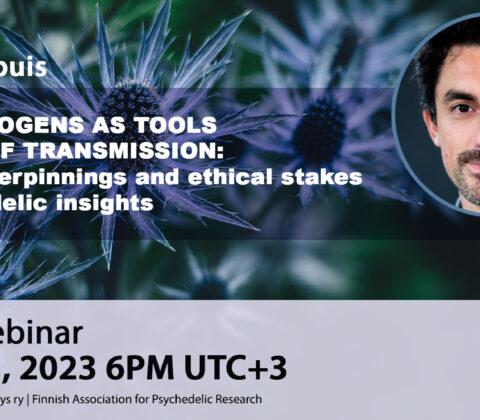
Webinar October 25th 2023 | David Dupuis – Hallucinogens as tools for belief transmission. Social underpinnings and ethical stakes of psychedelic insights
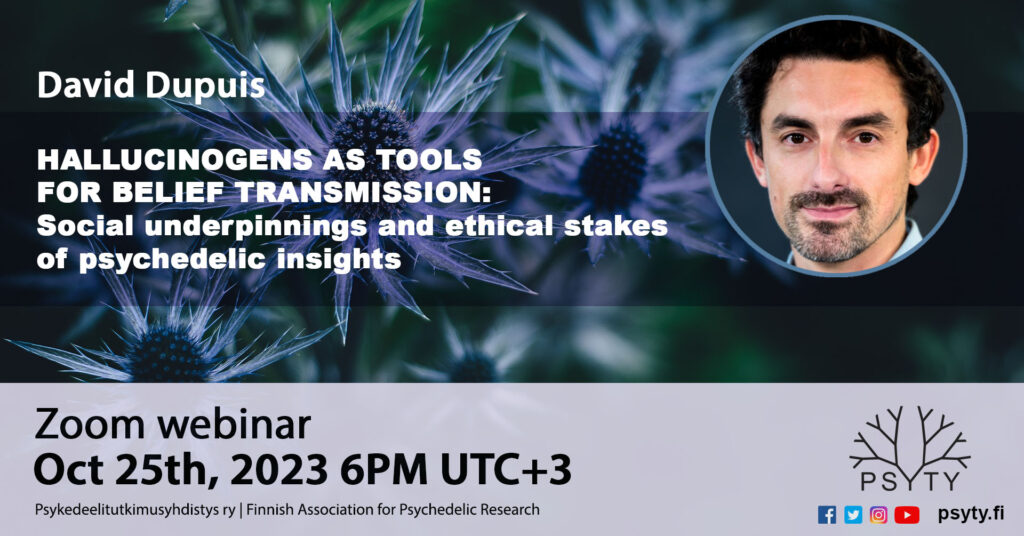
The use of psychedelics in the collective rituals of numerous indigenous groups suggests that these substances are powerful catalysts of social affiliation, enculturation and belief transmission. This feature has recently been highlighted as part of the renewed interest in psychedelics in Euro-American societies, and seen as a previously underestimated vector of their therapeutic properties. However, it also raises complex ethical questions in the context of the globalization of these substances. In the past decades, this property has been perceived as problematic by anticult movements and public authorities of some European countries, claiming that these substances could be used for “mental manipulation.”
On Wednesday October 25th, 6PM (UTC+3), social anthropologist David Dupuis, a Research Fellow at the French Institute of Health and Medical Research, will tackle this challenging topic in a webinar organized by the Finnish Association for Psychedelic Research.
Despite the fact that the notion of psychedelic as tools for mental manipulation has been criticized by the scientific community, alternative perspectives on how psychedelic experience supports enculturation and social affiliation have been yet little explored. Beyond the political issues that underlie it, the re-emergence of the concept of “psychedelic brainwashing” can then be read as the consequence of the fact that the dynamic through which psychedelic experience supports persuasion is still poorly understood. Beyond the unscientific and politically controversial notion of brainwashing, how to think about the role of psychedelics in the dynamics of transmission of belief and its stakes?
Drawing on ethnographic data collected in a shamanic center in the Peruvian Amazon, dr. Dupuis addresses this question through an ethnographic case-study. Proposing the state of hypersuggestibility induced by psychedelics as the main factor making the substances powerful tools for belief transmission, he will explore the ethical stakes of these observations on the current context of medicalization of psychedelics.
The event contains a Q&A section. The total length is 2 hours. Tickets are available in our web store. For members of the association who’ve paid their membership fee for 2023, the event is free of charge. If you want to pay your membership fee for this year or become a member, you’ll find our membership products on the main page of our web store. An email with a link for free registration to the event has been sent to members of the association. If you’re not sure if you’ve paid for your membership this year, feel free to ask us.
David Dupuis, Ph.D. (INSERM Research Fellow, IRIS/EHESS), is a Research Fellow at the French Institute of Health and Medical Research (INSERM) conducting research at the intersection of Psychedelic Studies, Anthropology of Mental Health & Cultural Psychiatry. His research interests lie mainly within the contemporary reconfigurations of the social status of psychedelic substances and hallucinatory experiences. He explores the cultural, political, clinical and ethical implications of these dynamics within Euro-American societies. His work is based on ethnographic fieldwork conducted since 2008 in Latin America (Peruvian Amazon, Mexico) and Europe (United Kingdom, France).
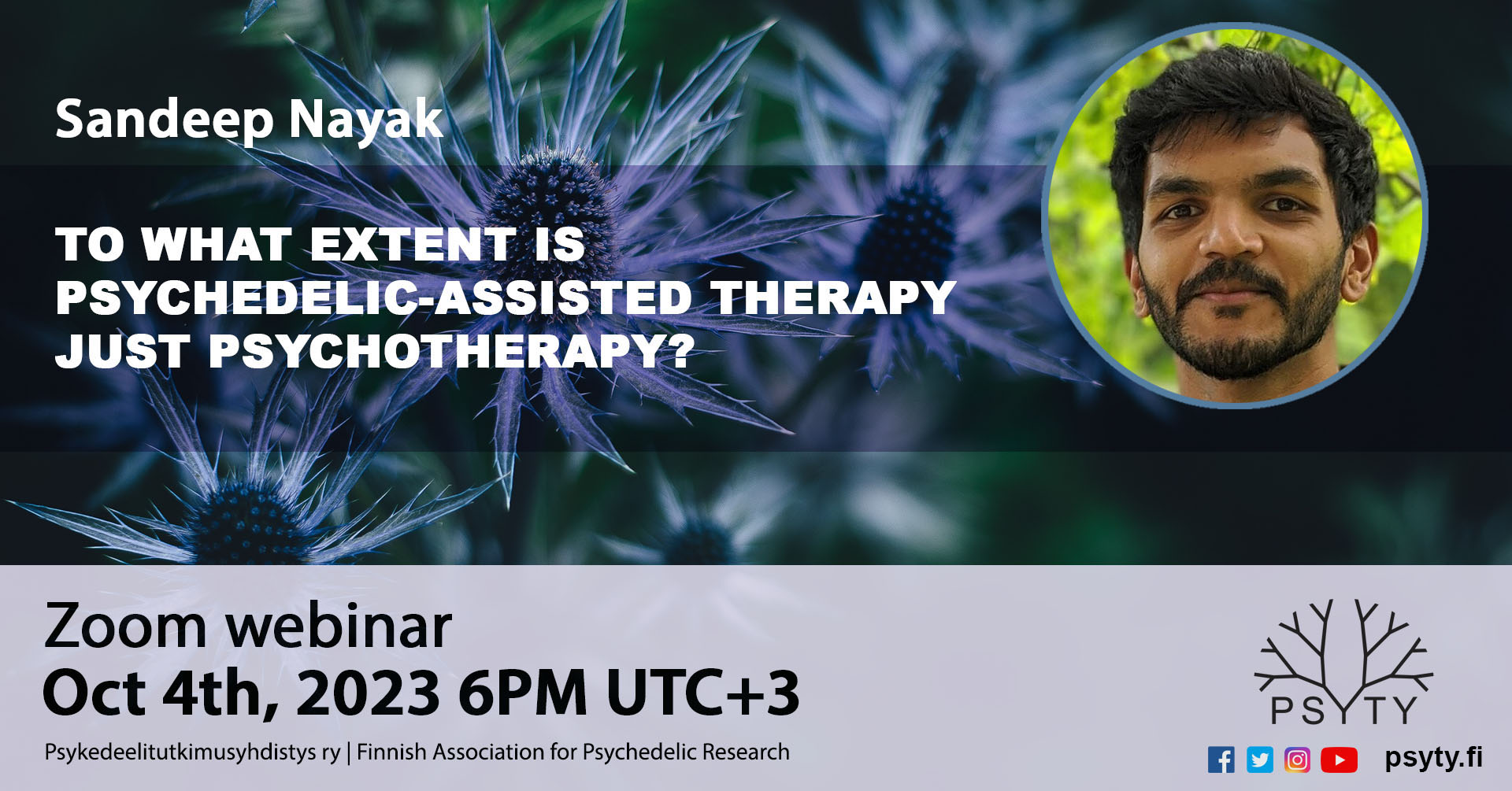
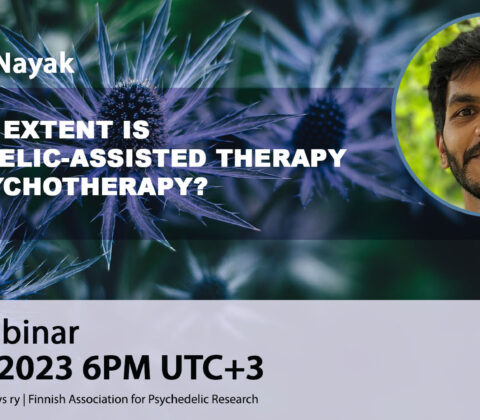
Webinar October 4th 2023 | Sandeep Nayak – To what extent is psychedelic-assisted therapy just psychotherapy?
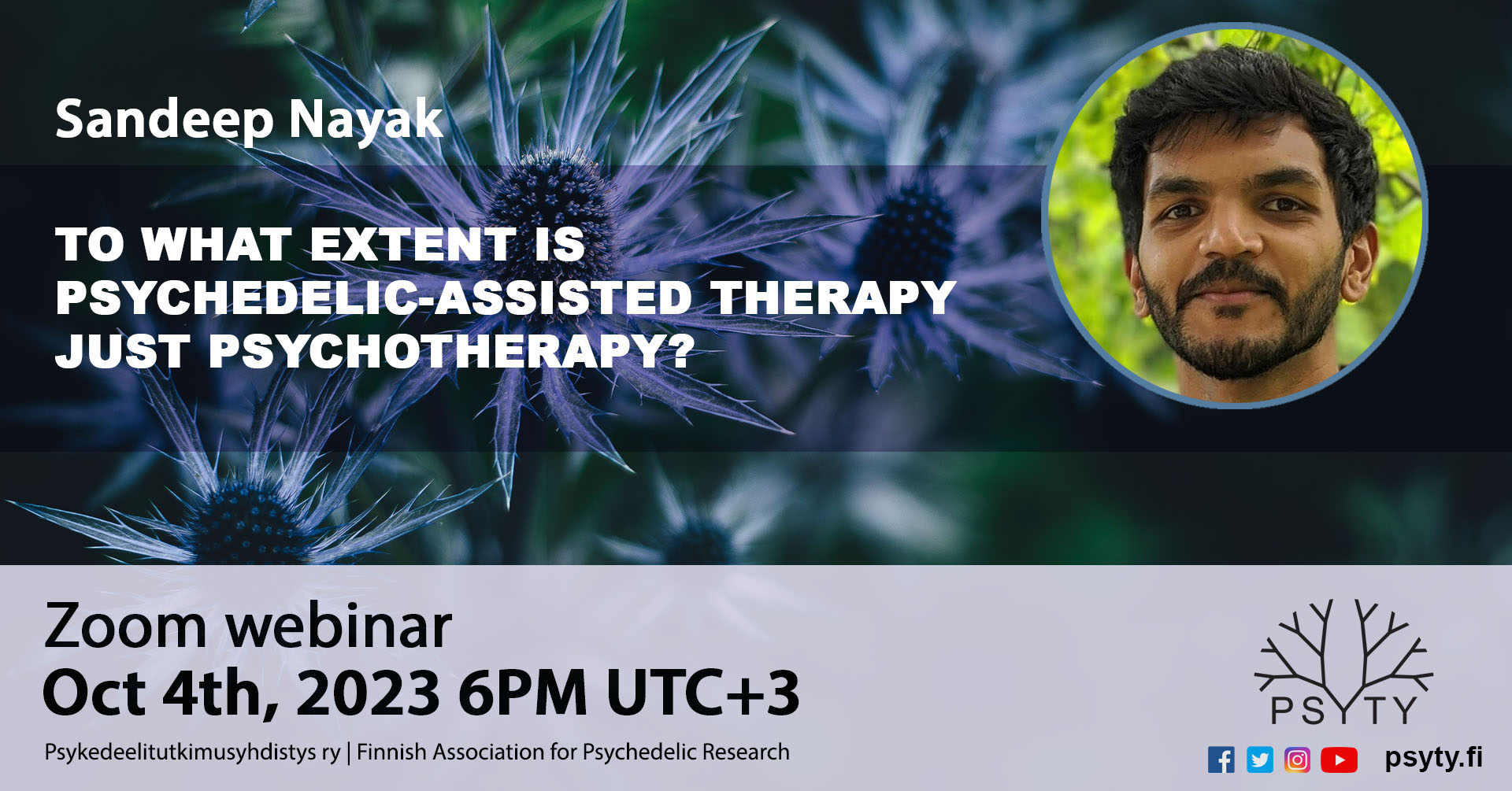
To what extent is psychedelic therapy just psychotherapy? How does psychedelic therapy relate to other forms of psychotherapy? What is psychotherapy, actually? On Wednesday October 4th at 6PM (UTC+3), we’ll dive into these questions in a webinar presentation offered by psychiatrist Sandeep Nayak, Assistant Professor at the Johns Hopkins Center for Psychedelic and Consciousness Research.
The lecture will begin by reviewing some evidence and controversy surrounding the idea that the subjective effects of psychedelic therapy are therapeutically active. Then we will discuss what psychotherapy is, and introduce the common factors of psychotherapy literature. This literature demonstrates that it is largely the shared features of psychotherapies, rather than their distinct features, that explains the bulk of therapeutic effects. Dr. Nayak will argue that psychedelic therapy, by exhibiting each common factor of psychotherapy and in some ways amplifying them, is psychotherapy. Finally, we will discuss problems of trial design methodology related to this.
The event contains a Q&A section. The total length is 2 hours.
Tickets are available from our web store. For members of the association who’ve paid their membership fee for 2023, the event is free of charge. If you want to pay your membership fee for this year or become a member, you’ll find our membership products on the main page of our web store. An email with a link for free registration to the event has been sent to members of the association. If you’re not sure if you’ve paid for your membership this year, feel free to ask us.
Sandeep Nayak is a psychiatrist and Assistant Professor at the Johns Hopkins Center for Psychedelic and Consciousness Research. He completed his MD at Brown University and his psychiatry residency at Johns Hopkins Hospital. He’s primarily focused on investigating psychedelics as treatments for psychiatric conditions, particularly substance use disorders and mood disorders.
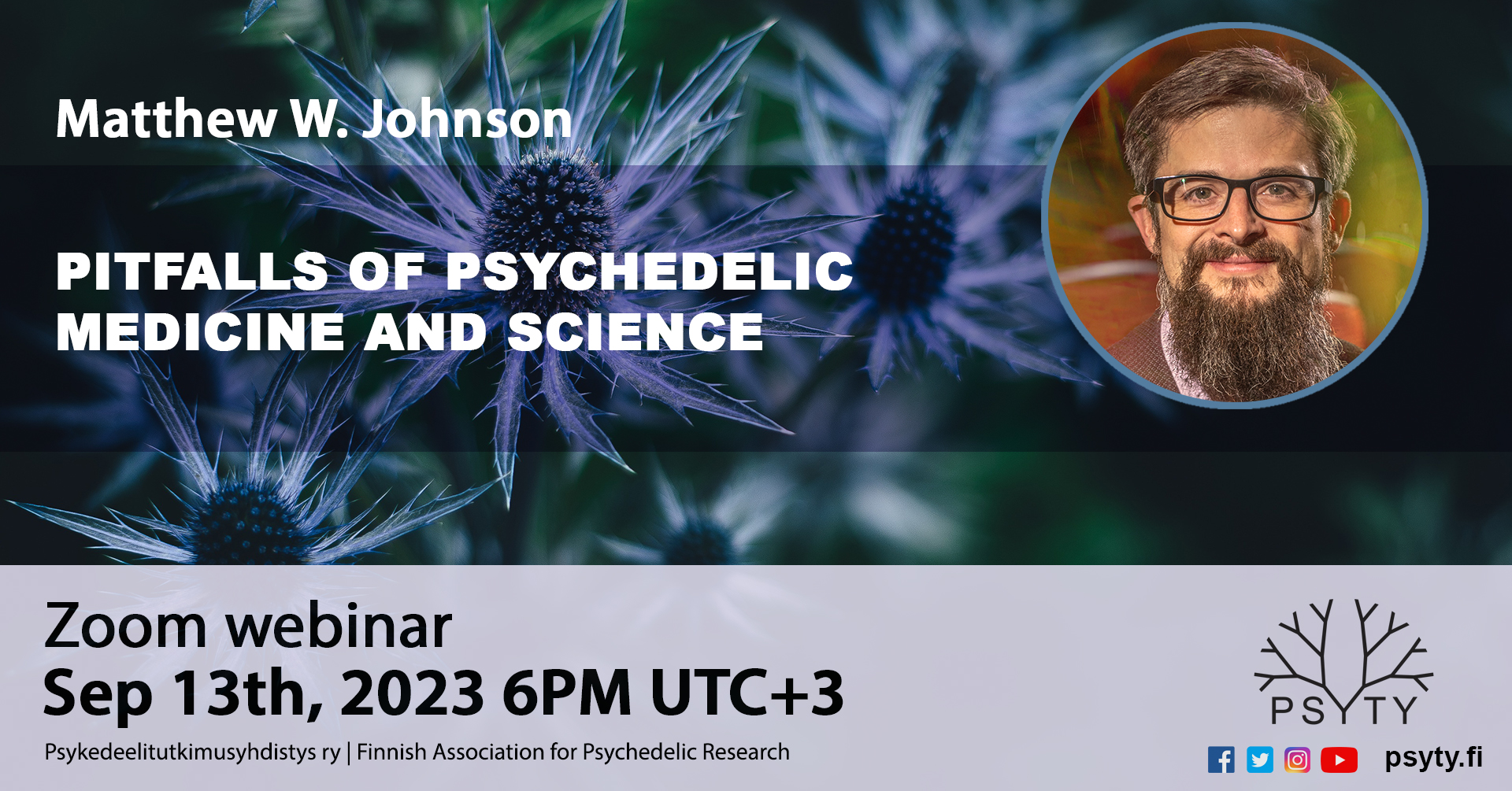
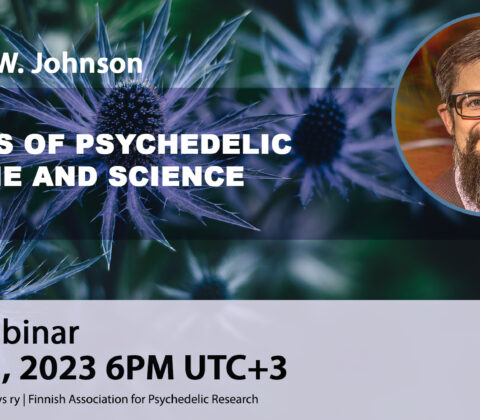
Webinar September 13th 2023 | Matthew W. Johnson – Pitfalls of Psychedelic Medicine and Science
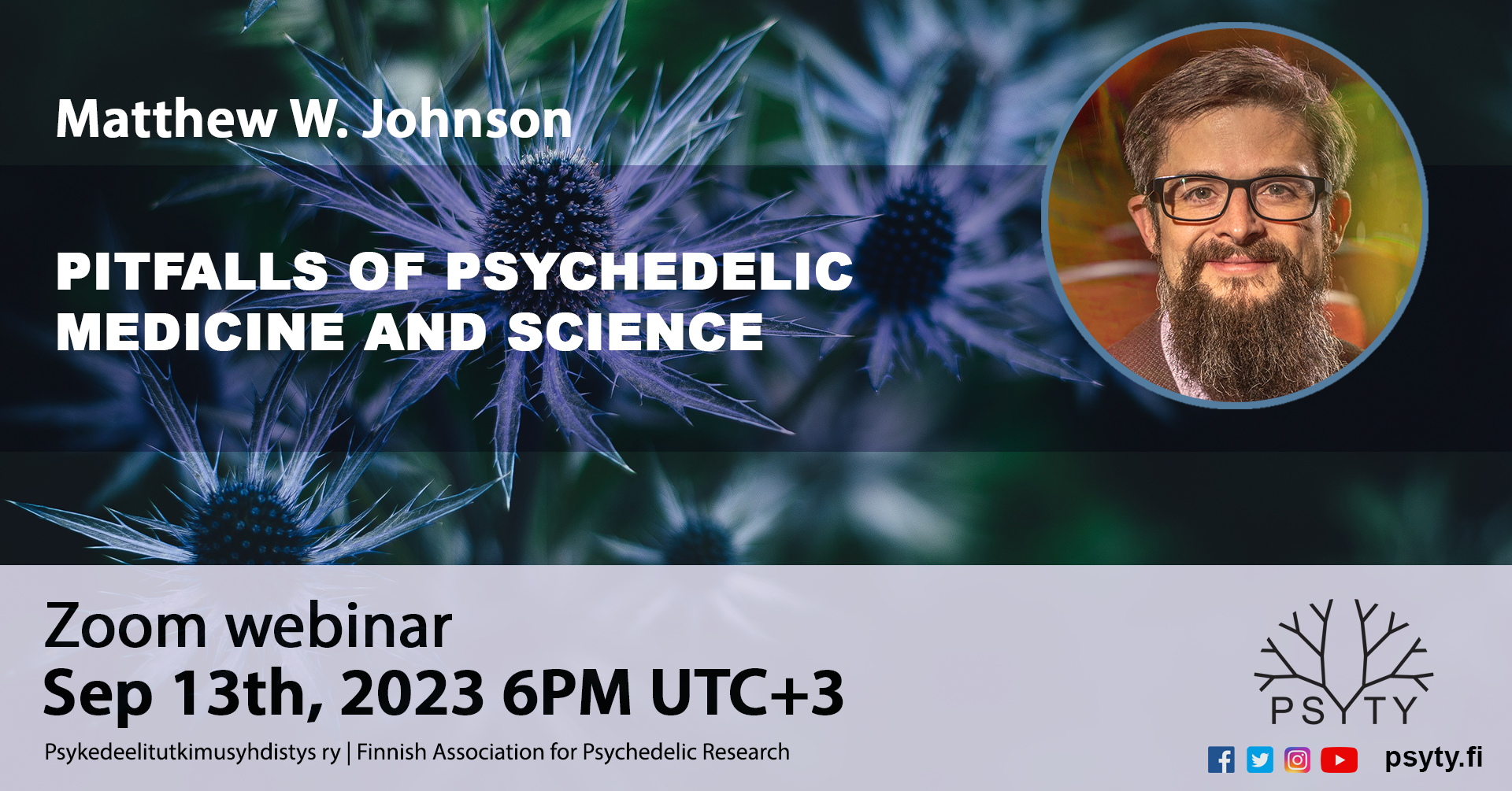
It is not uncommon for high dose psychedelic experiences to involve “big questions,” for example: What is the meaning of life? What is the nature of reality? Does God exist? In Psyty’s webinar presentation held on Wednesday, September 13th at 6PM UTC+3, Dr. Matthew W. Johnson will discuss the responsible handling of such experiences in therapeutic contexts.
Psychedelic experiences are believed to increase suggestibility and to occasion highly personal and meaningful experiences for patients. For this reason, a common but dangerous tendency for clinicians and scientists is to assume that psychedelic therapy constitutes an exception to many accepted clinical and ethical norms. Jonhson argues, however, that the intensity and meaningfulness of psychedelic effects call for even greater attention and adherence to the wisdom of clinical boundaries and norms.
Johnson argues that it is critical in clinical practice to let the patient determine her or his own metaphysical meaning, if any, from psychedelic experiences, rather than to impose or introduce the clinician’s own metaphysical beliefs, even ones that may seem innocuous to the clinician or scientist such as the “perennial philosophy.” Clinicians and scientists must avoid falling into the roles of guru or religious leader, and only introduce concepts grounded in their professional, empirically informed expertise.
Finally, regarding the science of psychedelics, much has been stated on the propensity of psychedelics to “expand consciousness”, and scientists have viewed psychedelics as tools to understand the “nature of consciousness.” Johnson calls for scientists to use precision when discussing concepts referred to as “consciousness” such as phenomenal consciousness, access consciousness, and self-concept, and be cautious to not overstate what is scientifically known regarding the relation between psychedelics and these concepts. He argues that scientists should do a better job with phenomenology regarding psychedelics and these concepts, meaning that we need to be judicious in distinguishing insights that people claim to have about, for example, phenomenal consciousness in psychedelic experiences, from what we can objectively claim to have learned about phenomenal consciousness from psychedelic research.
Tickets are available from our web store. For members of the association who’ve paid their membership fee for 2023, the event is free of charge. If you want to pay your membership fee for this year or become a member, you’ll find our membership products on the main page of our web store. An email with a link for free registration to the event has been sent to members of the association. If you’re not sure if you’ve paid for your membership this year, feel free to ask us.
Matthew W. Johnson, Ph.D., is The Susan Hill Ward Endowed Professor of Psychedelics and Consciousness Research at Johns Hopkins. Working with psychedelics since 2004, he has played a role in the modern-day revival of psychedelic research. He has published research on psychedelics and mystical experience, personality change, tobacco smoking cessation, cancer distress treatment, and depression treatment. In 2021 he received as principal investigator the first grant in about 50 years from the US government to administer a classic psychedelic as a treatment, specifically psilocybin for tobacco addiction. He is also known for his expertise in behavioral economics, addiction, sexual risk behavior, and research with a wide variety of drug classes. He has been Interviewed by Anderson Cooper on 60 Minutes, the New York Times, the Washington Post, the Wall Street Journal, CNN, NPR, Fox News, BBC, the Lex Fridman Podcast, and in Michael Pollan’s book How to Change Your Mind.
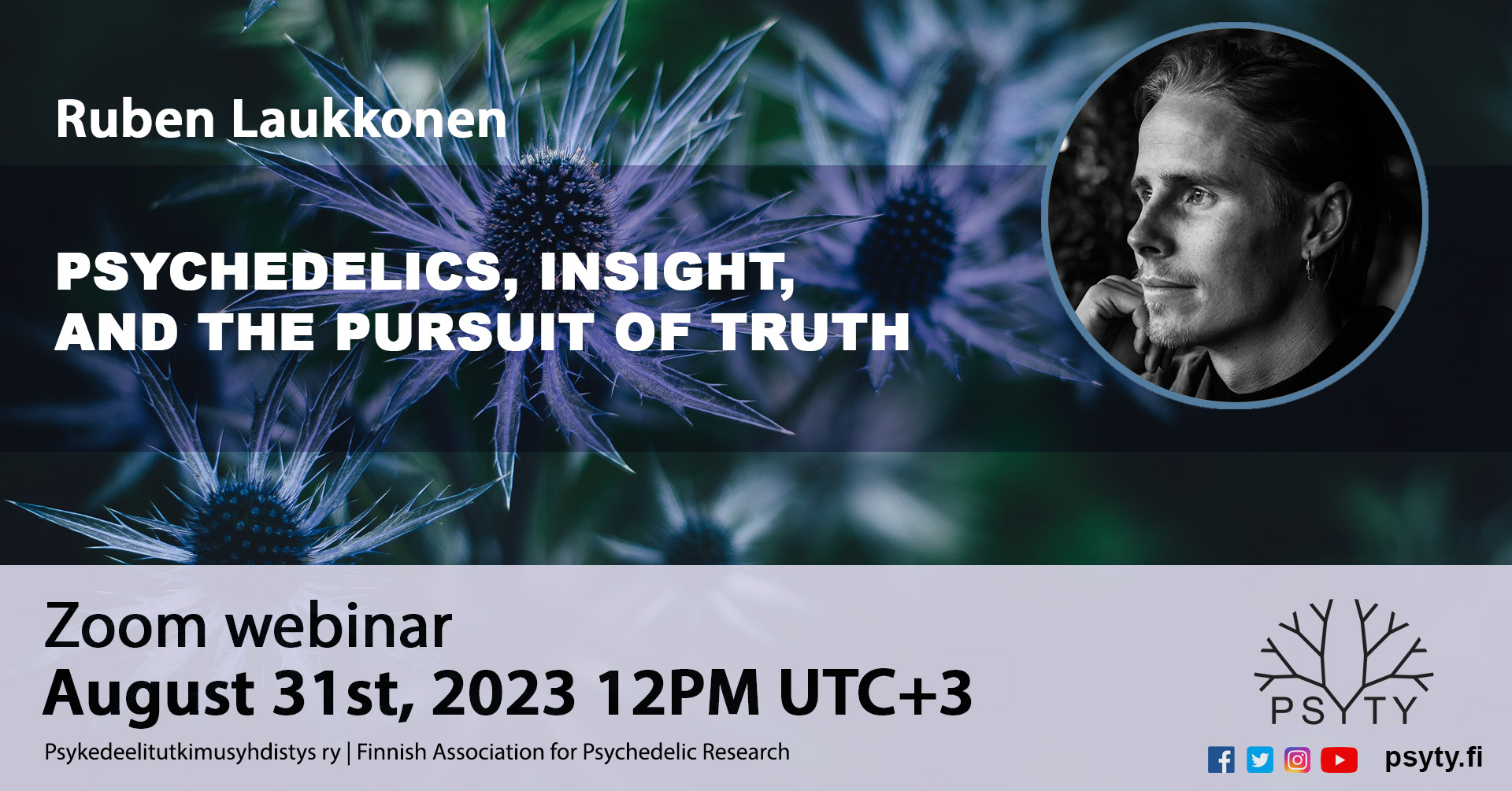
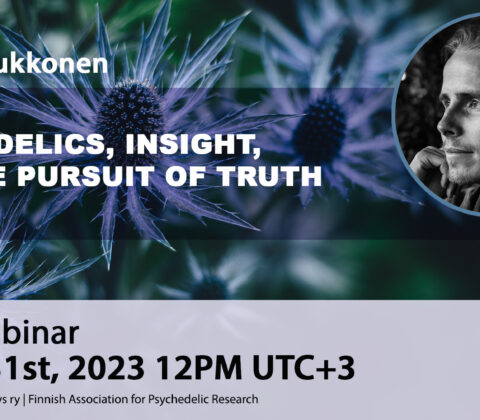
Webinar August 31st 2023 | Ruben Laukkonen – Psychedelics, insight, and the pursuit of truth
The emergence of insights during psychedelics is remarkably important for therapeutic progress. Insights can be a source of creativity, discovery, and even healing, but they can also mark the beginning of a delusional episode, or potentially entrench and perpetuate false beliefs. From this starting point, neuroscientist Ruben Laukkonen will present a fascinating webinar lecture on August 31st at 12PM UTC+3.
Do note the unusual time – due to the time zone of the lecturer, the webinar starts at noon (Finnish time).
In the talk, Dr. Laukkonen will review evidence from a series of experiments that expose both the light and the dark side of insight. These findings will be integrated within an active inference account, wherein feelings of insight can give rise to, and entrench, new beliefs and perspectives during psychedelic experiences. Put simply, the combination of intense insights and relaxed beliefs creates the profound potential for plasticity and change. However, this plasticity risks the insight-catalysed lodging of false or maladaptive beliefs (possibly triggering mania). These ideas will be grounded by discussing the different kinds of insights that arise and how to nudge them in the “right” direction, and how we might define that direction.
Tickets are available from our web store. For members of the association who’ve paid their membership fee for 2023, the event is free of charge. If you want to pay your membership fee for this year or become a member, you’ll find our membership products on the main page of our web store. An email with a link for free registration to the event has been sent to members of the association. If you’re not sure if you’ve paid for your membership this year, feel free to ask us.
Dr. Ruben Laukkonen is a principal investigator and lecturer at Southern Cross University and holds honourary fellowships at the Vrije Universiteit Amsterdam and The University of Queensland. Ruben’s research uncovers empirically grounded and experientially authentic models of meditation, insight, and non-duality. Using a combination of methods including behaviour, neuroimaging, machine learning, and phenomenology, he is investigating some of the rarest states of consciousness available to human beings. He has published articles in leading journals, regularly speaks at international conferences, consults for the Organisation of Economic Cooperation and Development. Ruben has an eclectic contemplative background, including traditions such as Zen, Advaita, and Theravada.
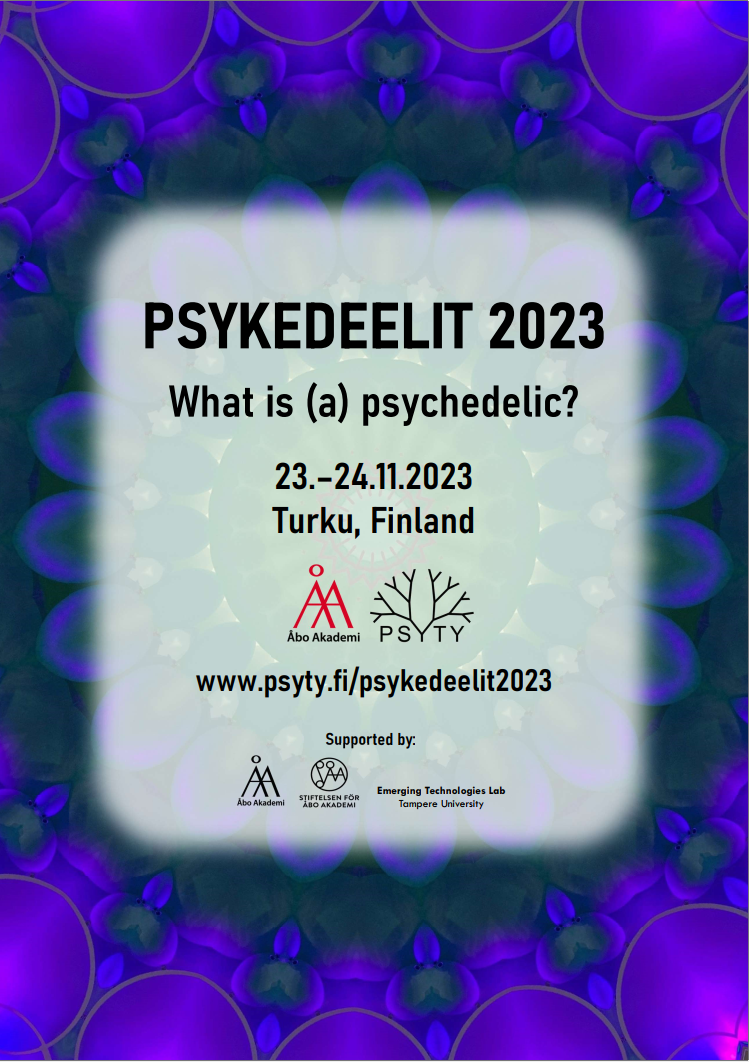
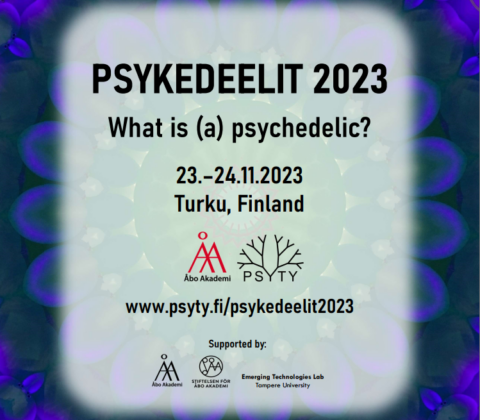
The 2nd Finnish Interdisciplinary Conference on Psychedelics in November
Psykedeelit 2023
The 2nd Finnish Interdisciplinary Conference on Psychedelics
What is (a) psychedelic?
November 23–24, 2023
Åbo Akademi University, Turku, Finland
In collaboration with Åbo Akademi University and the Emerging Technologies Lab of Tampere University, we are organizing Psykedeelit 2023 – The 2nd Finnish Interdisciplinary Conference on Psychedelics, in Turku, Finland, on November 23–24, 2023. This year’s conference focuses on the specific theme of What is (a) psychedelic?
Invited keynote speakers of the conference are psychologist Dr. Max Wolff (Charité – Berlin University of Medicine & MIND Foundation), who will talk about how psychedelic-assisted psychotherapy differs from ordinary psychotherapy, and evolutionary anthropologist Dr. Manvir Singh (Institute for Advanced Study, Toulouse), who will talk about psychedelics in relation to shamanism and indigenous cultures. In addition, we will hear over 25 other oral presentations on psychedelics and the psychedelic, by researchers from a variety of fields of science from Finland and abroad. Academic posters will also be presented.
Registration is now open! Proposals for academic posters may also still be submitted.
See https://psyty.fi/psykedeelit2023 for registration, details, and an updating program.
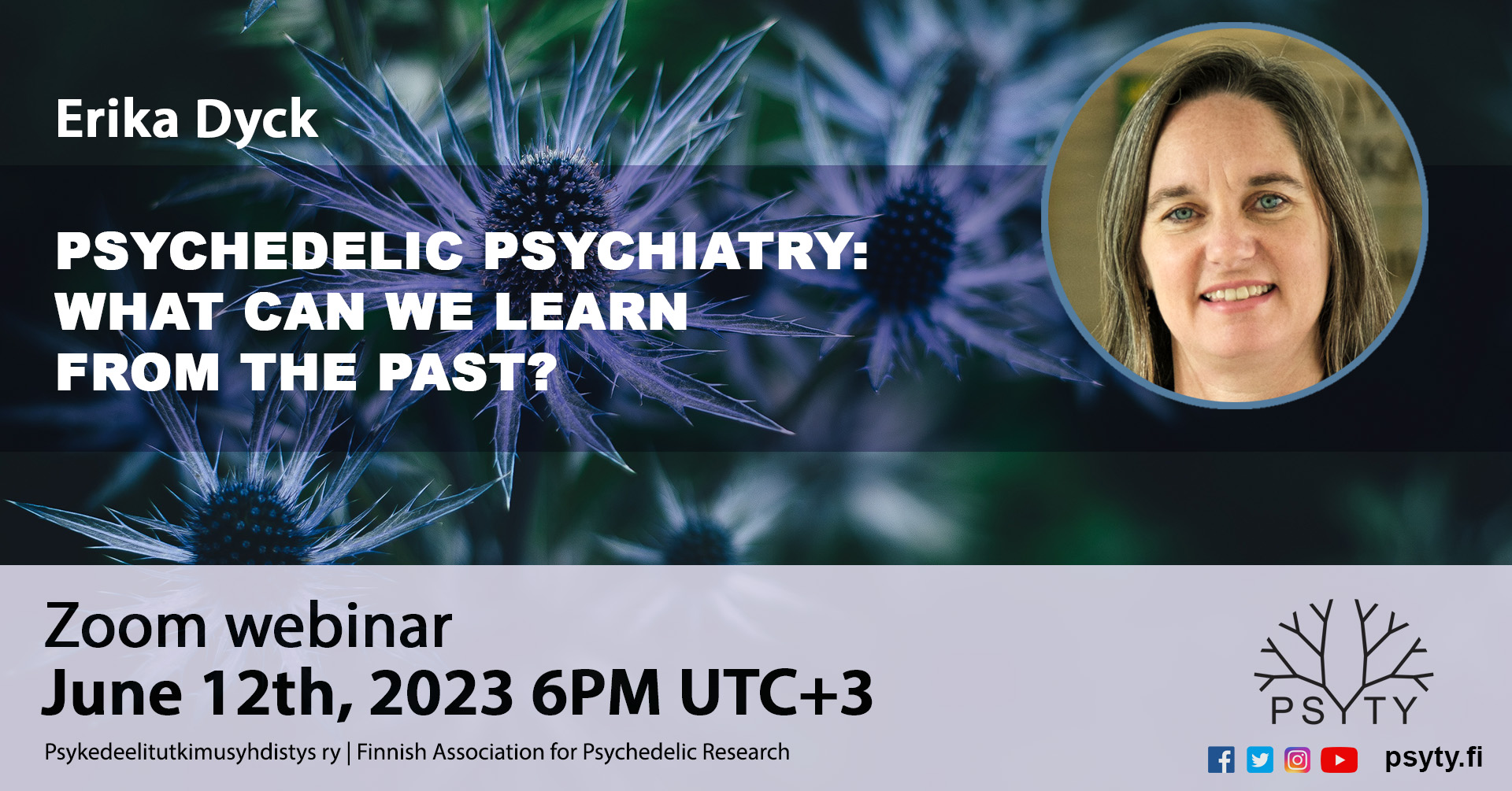
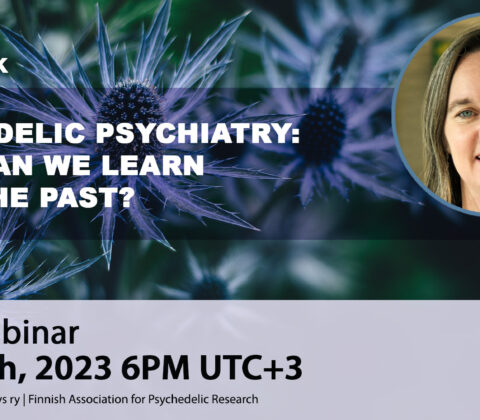
Webinar June 12th 2023. Erika Dyck – Psychedelic Psychiatry: What can we learn from the past?
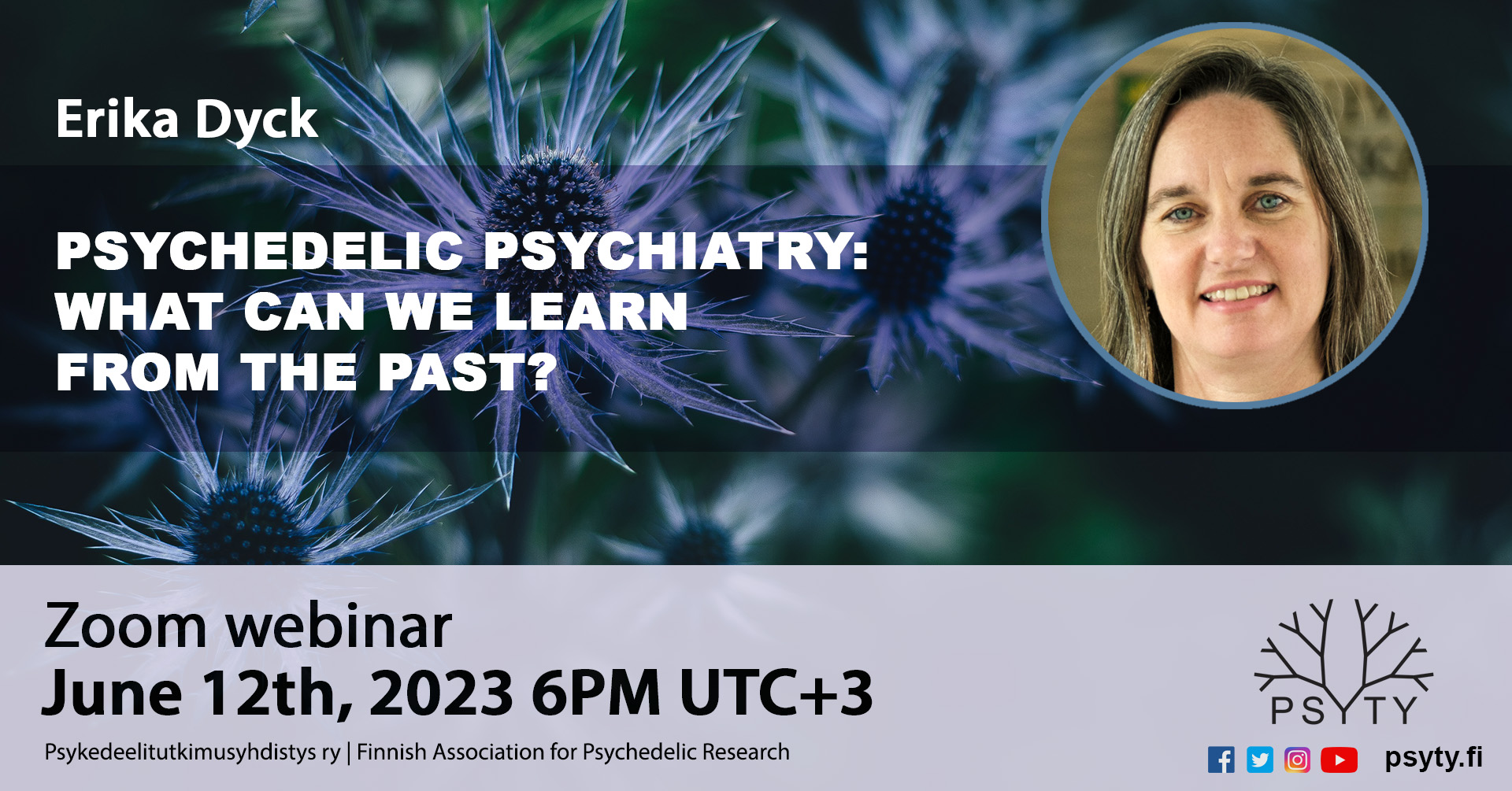
In 1956, psychiatrist Humphry Osmond first used the word ‘psychedelic’ to describe the feelings and sensations associated with LSD. The term, conceived during his correspondence with the literary genius Aldous Huxley, was soon added to the English lexicon. In spite of the popular connotations now connected to the word, Osmond developed the term out of his LSD experiments with colleagues at the University of Saskatchewan. The experiments led him to propose a new theory of schizophrenia alongside a somewhat radical suggestion to treat alcoholism using LSD. In contrast with many of his psychiatric contemporaries, Osmond and his colleagues maintained that pharmacotherapies flourished most when combined with tenets of empathy, deference, and even ritual – features he learned from Indigenous ceremonies with plant medicines.
Although Osmond was not alone among his colleagues in the 1950s fascinated with the medical applications of psychedelics, his work in Canada made him a major figure in the history of LSD and addiction research, but also an awkward character in a looming countercultural revolution. LSD was banned from use by the late 1960s for a combination of moral and scientific reasons, but new developments in the 21st century are encouraging policy makers and researchers to revisit these historical studies.
On Monday, June 12th at 6PM UTC+3, in a Zoom webinar presented by professor Erika Dyck from the University of Saskatchewan’s Department of History, we will dive into the history of psychedelics and consider what we might learn from the past as we entertain a psychedelic renaissance. What do we have yet to learn from Indigenous roots of psychedelic ceremonies, or from missteps of the past that might warrant a retrial? We will consider examples from the past and also look at how historical ideas have continued to influence the psychedelic movement today.
Tickets are available from our web store. For members of the association who’ve paid their membership fee for 2023, the event is free of charge. If you want to pay your membership fee for this year or become a member, you’ll find our membership products on the main page of our web store. An email with a link for free registration to the event has been sent to members of the association. If you’re not sure if you’ve paid for your membership this year, feel free to ask us.
Erika Dyck is a Professor and a Canada Research Chair in the History of Health & Social Justice at the University of Saskatchewan’s Department of History. Her interdisciplinary research brings social sciences and humanities perspectives to scientific and medical subjects. Her work has been published in medical, legal, economic, literary, philosophical, anthropological and historical venues. She is the author of several books, including: Psychedelic Psychiatry: LSD from Clinic to Campus (Johns Hopkins, 2008; University of Manitoba Press, 2011); Managing Madness: the Weyburn Mental Hospital and the Transformation of Psychiatric Care in Canada (University of Manitoba Press, 2017), which won the Canadian Historical Association Prize for best book in Prairie History; and The Acid Room: the psychedelic trials and tribulations of Hollywood Hospital (2022), nominated for Saskatchewan and BC book awards. She is also the co-editor of Psychedelic Prophets: The Letters of Aldous Huxley and Humphry Osmond (2018); and A Culture’s Catalyst: Historical Encounters with the Native American Church in Canada and Peyote (2016), and a forthcoming collection with Chris Elcock, Expanding Mindscapes: a global history of psychedelics (MIT Press 2023). She is the co-editor of the Canadian Journal of Health History (2015-present), the President of the [International] Alcohol and Drugs History Society; and co-editor of 2 international books series with McGill-Queen’s Press – History of Health and Medicine, and Intoxicating Histories.
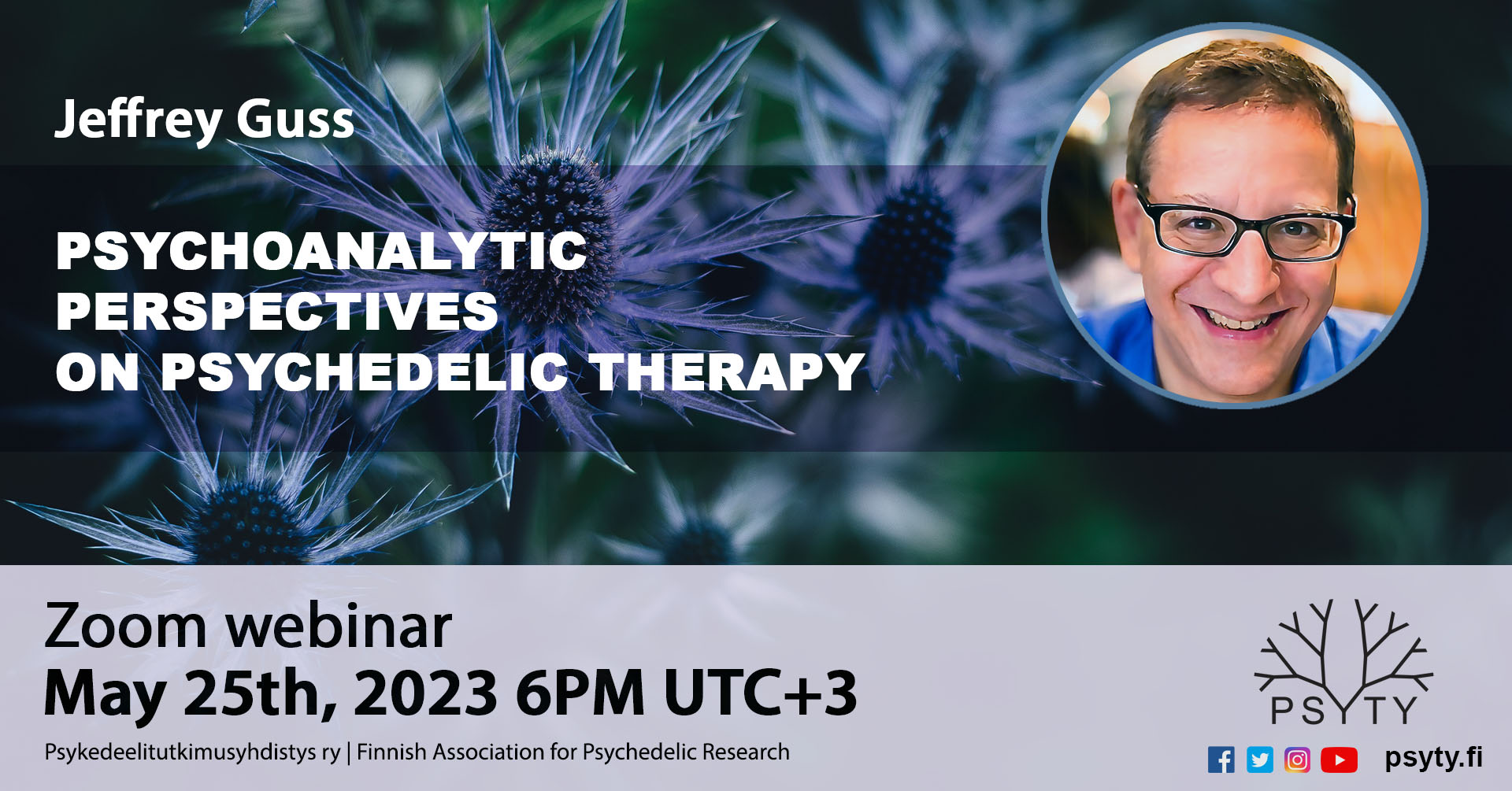
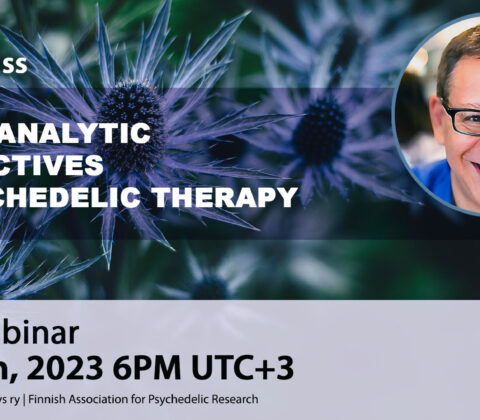
Webinar May 25th 2023. Jeffrey Guss: Psychoanalytic Perspectives on Psychedelic Therapy

What do psychedelics have to offer for dealing with existential crises? What are the correspondences between psychotherapy and shamanic healing? How can psychoanalytic perspectives enrich our understanding of psychedelics, and vice versa? We’ll be spending time with these questions on Thursday, May 25th at 6PM UTC+3 in a Zoom presentation by psychiatrist, psychoanalyst, researcher and teacher Jeffrey Guss, whose experience includes working with psilocybin in a study for patients suffering from existential anxiety related to life-threatening illness.
The presentation will begin with a description of psychedelic experiences that are not in the context of psychotherapy and describe correspondences between psychotherapy and shamanic healing. Guss will then discuss the core processes that may occur as part of psychedelic psychotherapy, describing psychedelic phenomeonlogy in psychoanalytic and neuropsychoanalytic terms. In the last part of his talk, he will offer a case presentation of a participant he worked with in the aforementioned study. Following the case presentation, he will integrate elements of this individual’s psilocybin journey with the core processes described at the beginning of the talk.
Tickets are available from our web store. For members of the association who’ve paid their membership fee for 2023, the event is free of charge. If you want to pay your membership fee for this year or become a member, you’ll find our membership products on the main page of our web store. An email with a link for free registration to the event has been sent to members of the association. If you’re not sure if you’ve paid for your membership this year, feel free to ask us.
Jeffrey Guss, MD is a psychiatrist, psychoanalyst, researcher, and teacher with specializations in psychoanalytic therapy and psychedelic therapy. He was Co-Principal Investigator and Director of Psychedelic Therapy Training for the NYU School of Medicine’s study on psilocybin-assisted psychotherapy in the treatment of cancer related existential distress. He is currently a Lead Trainer with Fluence, with a focus on the integration of psychedelic therapy with psychoanalysis. He is a study therapist in the NYU study on Psilocybin-Assisted treatment of Major Depressive Disorder. He has published on the integration of Acceptance and Commitment Therapy with psychedelic assisted therapy for MDD in Journal of Contextual and Behavioral Science and the influence of therapists’ first-hand experience with psychedelics on psychedelic-assisted psychotherapy research. He is an Instructor and Mentor with the California Institute of Integral Studies’ Center for Psychedelic Therapies and maintains a private practice in New York City.

